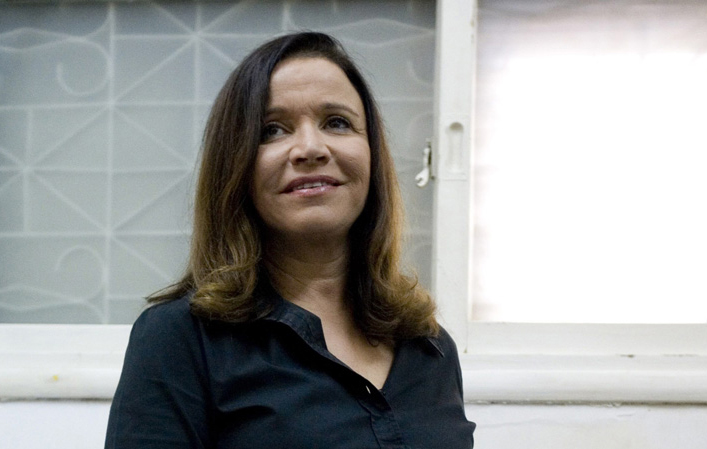Australia/Israel Review
Shelly-Shocked
Dec 20, 2011 | Amotz Asa-El

Israel’s Labor Party reboots
Amotz Asa-El
A decade after it last held power, and some two generations after losing its hegemonic sway over Israeli politics – the rehabilitation of Israel’s Labor party seems finally underway.
The election in September of Shelly (Rachel) Yachimovich as Labor Chairperson, the eighth election of a party leader since the assassination of Yitzhak Rabin in 1995, appears to reflect an ideological reckoning and a strategic reorientation that, in due course, may well bear electoral fruit.
Israel’s current political map is dominated by six conservative parties that garner 60 percent of the Jewish vote, but it wasn’t always such. In its first three decades,the Jewish state was dominated by Labor. Under the leadership of David Ben-Gurion, Golda Meir, and Levi Eshkol, Labor won handily election after election. Though it never won enough votes to rule without coalition partners, it always emerged well ahead of the pack, and always during those years it held, in addition to the premiership, the defence, foreign, finance, and education portfolios. That is why Labor is considered, even by its rivals, the builder of the Jewish State.
Labor’s domination came to an end with Likud’s historic victory in 1977, the result of a general disillusionment inspired by the Yom Kippur War and a slew of corruption scandals. Labor has since then had three premierships, but it never restored its historic following, even after Shimon Peres led a spectacular economic rehabilitation in 1985. By the 2009 election the party had been so marginalised that it came in fourth, winning hardly a tenth of the electorate, And then last year even this minuscule faction split, leaving Labor with a mere eight lawmakers – less than 7% of the 120 seat Knesset.
Now, following its primary elections in September, it seems likely that 2011 will be remembered as the low point in the party’s history, and that its climb back to relevance, while likely to be protracted and arduous, has nonetheless begun.
To understand what Labor’s new leader has so far done right one must first understand what her predecessors did wrong.
Back in the 1980s, when its leaders understood that Likud’s social and ideological challenge was both potent and durable, Labor counterattacked with two weapons: competence and peace. At a time when Israel faced triple-digit inflation and zero growth, Labor said it had more governmental experience and better economic experts; and indeed, once back at the helm Labor led an austerity plan that was so successful it became a role model for ailing economies worldwide. Meanwhile, at a time when Likud was blamed for dragging Israel into an unnecessary war in Lebanon, Labor promised to strike land-for-peace deals.
Unfortunately for Labor, its successful economic plan came at the expense of its socialist conviction, as the plan subdued the unions and largely undid the welfare state on which Labor had prided itself, and with which it was identified. Having defeated the unions it indirectly admitted they had indeed been a major cause of the economic illnesses that Labor ultimately had to treat.
This, coupled with the nationalistic Likud’s effective courting of the working class, meant Labor became, intentionally or not, the party of the middle class, a status it accepted and sought to consolidate by promising peace-driven prosperity. This identity as a party of peace crusaders was necessary not only for electoral appeal, but also as an ideological diversion from the party’s problematic history as originator of the centralised, statist, and unionised economics that led Israel to the brink of bankruptcy.
However, Labor’s peace efforts, from the Oslo Accords of 1993 to the Camp David summit of 2000, were followed by a war of terror for which a critical mass of the electorate ultimately blamed Labor. Following Ariel Sharon’s landslide defeat of Ehud Barak in winter 2001, Labor never again came close to recovering.
Furthermore, since Golda Meir’s resignation in 1974 Labor repeatedly placed at its helm people who were products of the broad Israeli military/defence sector. These included two former chiefs of staff (Rabin and Barak), two other generals (Amram Mitzna and Binyamin Ben-Eliezer), and Shimon Peres, godfather of Israel’s aerospace industry, military exports, and nuclear program. The only exception to this rule, former union leader and small-town mayor Amir Peretz, initially seemed to herald a post-military era and a social policy agenda. But he soon failed his party by joining Ehud Olmert’s cabinet in 2006 as defence minister, a choice he and his party grew to lament as he subsequently resigned in the aftermath of the Second Lebanon War.
This is the legacy which Yachimovich belies biographically, and is out to overturn politically.
A divorced mother of two and a career journalist who only entered politics five years ago at age 46, Labor’s new leader is a rare species in Israeli politics, and in fact in world politics. Most other female leaders, from Angela Merkel to Julia Gillard, reached national leadership after having previously served as ministers.
That also goes for Golda Meir, Labor’s previous female leader who, while also a divorced mother, was a career politician who became party leader and prime minister after having served for a decade as foreign minister, and before that as minister of labor and ambassador to Moscow. Yachimovich has held no executive office. After serving in the IDF as a personnel officer and graduating from Ben-Gurion University in psychology and sociology she pursued a journalistic career, and became known as the outspoken host of a popular radio talk-show called “What’s Burning?” and the TV talk-show “Meet the Press.”
Daughter of a communist construction worker who, like his wife, was a Polish Holocaust survivor, Yachimovich inherited a social zeal that for a while seemed quixotic and anachronistic. In her several years as a lawmaker she has focused exclusively on social issues, successfully introducing legislation that: extended severance payments and maternity leaves; improved tax breaks for discharged soldiers; forced supermarkets to let cashiers sit while working; required employers to clarify pay slips; upgraded public-transport information; and compelled the security forces to prefer local producers in textile tenders even if their proposals are up to 50% higher than foreign competitors’.
Then again, while this legislative fertility earned her respect, it still seemed anecdotal and piecemeal – until last summer, when hundreds of thousands took to the streets protesting what they saw as the yawning gap in Israel between rich and poor, and the abuse of the middle class by a thin upper crust of tycoons.
Yachimovich neither orchestrated nor inspired the protesters, but she and they are clearly part of one zeitgeist. At the same time, the protest movement caught the main opposition party, Kadima, totally off guard.
Under the leadership of former Foreign Minister Tzipi Livni, the centrist party had repeated Labor’s historic mistake of focusing on peacemaking while avoiding domestic issues. In what has unfolded as a war of minds between two women, Yachimovich chose the opposite strategy; not only did she focus on domestic issues, she gestured rightwards by saying that setting up Jewish settlements in the West Bank, while politically wrong, was not immoral. Now polls indicate that Labor is poised to siphon off about a third of Kadima’s following, and thus restore its position as the second largest party in Israel.
Yachimovich and her party have few illusions concerning her ability to win the next election, which is likely a good two years away. Her lack of executive experience and her social militancy, including an anti-market policy of restricting senior executive pay, make such a prospect unrealistic in the eyes of almost all pundits and politicians.
Even so, when Prime Minister Binyamin Netanyahu surprised his own party by moving its primaries up to January, Labor and its new leader remained unperturbed – they feel ready, even hungry for battle. Kadima, on the other hand, was once again caught off guard, as speculation grew Netanyahu might be eyeing, further down the road, early elections, hoping to capitalise on a re-energised Labor’s making inroads into his main rival, Kadima.
Paradoxically, then, Likud’s Thatcherist leader and Labor’s social firebrand could now find themselves jointly executing a pincer movement on the centrist Kadima, each realising there is enough electoral flesh on the main opposition party’s bones for both Labor and Likud to feed on. If indeed this materialises, Yachimovich’s election will have accomplished two things: Shifting the focus of Israel’s political discourse from defence and foreign affairs to social and economic issues; and restoring the bi-partisan structure that once dominated Israeli politics.
Then again, no one, least of all the cautious Yachimovich, is mentioning the previous era, when a proudly socialist Labor dominated all things Israeli – all by itself.
Tags: Israel






